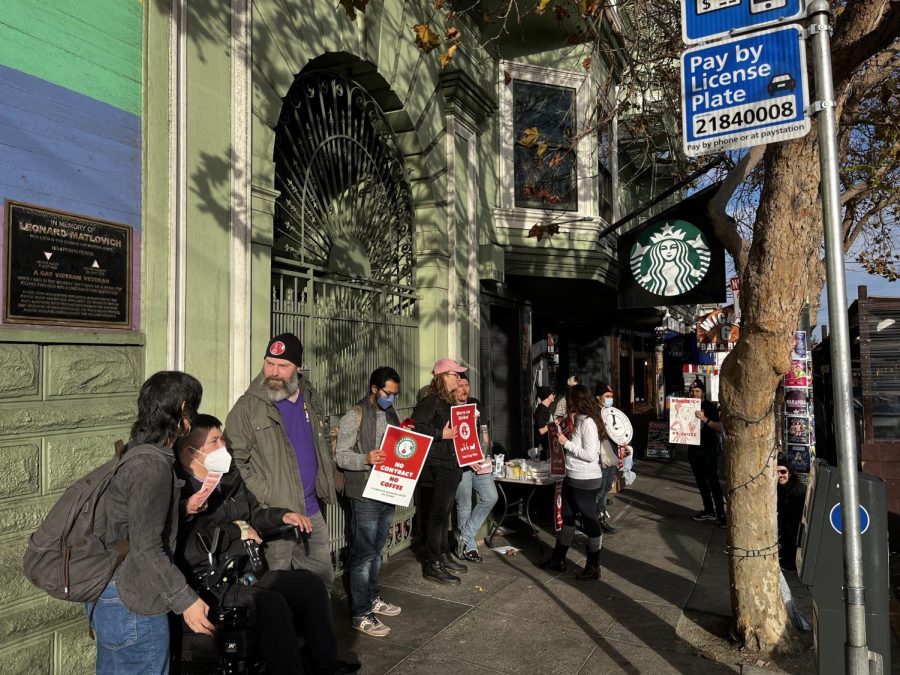
The butterfly effect: Starbucks Workers United
January 23, 2023
Just a 10-minute drive away, the Starbucks employees on 18th St. in San Francisco held a strike of their own on the same day.
For employees like James Kreiss, who has been the shift supervisor at the Starbucks location for three years, it’s been a long day of striking. Kreiss is a member of Starbucks Workers United, a union focused on the Starbucks coffee chain boasting over 250 unionized stores and 21,000 supporters, according to its website.
From 6 a.m. to 6 p.m., Kreiss and other employees stood outside their store with food, drinks, music, and signs, interacting with pedestrians passing by.
Although it’s their third year working at the location, Kreiss has worked for Starbucks for four years.
Standing outside of their closed store, Kreiss and others waved bright red signs with “No contract, no coffee” in bold lettering to demand negotiations with Starbucks.
“Starbucks is not negotiating with us. They’re doing this huge union-busting campaign. We provided them with everything we needed, but we’re still waiting on them to give us a date to start our bargaining. This is true for most of these other union stores—and there are over 240,” Kreiss said.
But for the few stores that do get to bargain, according to Kreiss, their voices are still disregarded.
“When employees go, they show up fully prepared and ready to bargain. Starbucks has a team of lawyers that show up for five minutes and then dip. They don’t even hear us out,” Kreiss said.
At Kreiss’ location, the stories of other Starbucks employees like them inspired their strike.
“We first heard about unionizing when the store in Buffalo, New York unionized their store about a year ago. We started talking about it then, but we didn’t start our process here until we had a five-month shutdown. That was our trigger to be like, ‘This is not okay.’ We weren’t supported by management and we needed to be able to speak up for ourselves,” Kreiss said.
After the shutdown, Kreiss and their group began to reach out to the rest of their store.
“We filed to have an election in May and held that election in August and won. Now we’re waiting to bargain over a contract with Starbucks,” Kreiss said.
Not all locations successfully unionize, however.
As many kids do, Ella Clark dreamed of being president when she grew up. Now, a senior at Tamalpais High School, Clark has got a lot on her plate. She remains interested in politics and is the president of the Model United Nations and Junior State of America clubs at her school. Clark also volunteers to help underserved youth in her spare time.
Additionally, like many other teenagers, she got a job at the Strawberry Village Starbucks in her city, Mill Valley, because she needed to make some money. She chose Starbucks because she agreed with its mission.
“Starbucks preaches a lot of sustainability. There is this program, Grounds for Your Garden, where instead of throwing out our grounds, allegedly, we package them up and give them out to customers for their gardens to use as fertilizer. I also like how employees are called partners, so I really did and still do align with Starbucks’s mission. That’s why I chose to work at Starbucks,” Clark said.
Like Kreiss, Clark heard about the store in Buffalo that had unionized as well as the union-busting campaign that came afterward and became interested in joining the movement in 2021. She eventually reached out to the organizers in Buffalo and they encouraged her to unionize.
“I said, ‘Well, we don’t really have any reasons to at the moment. I’m not upset with my job, I love my job very much.’ The Buffalo organizers explained that you don’t have to hate your job to want to unionize and you don’t have to hate the company that you work for to unionize. And then the more that I went into the process, the more issues I saw at Starbucks,” Clark said.
Clark got on a call with some of the lead organizers in Buffalo who walked her through the unionizing process.
“I reached out to my work friend and talked to her about it. She was like, ‘Yes, let’s do this.’ So we started soliciting coworkers—we’d go up to them sometimes in the back of the store. Like ‘Look, this is what a union is. Are you interested?’ Then, in order to file a petition with the National Labor Relations Board (NLRB), you need one-third of your store to fill out the union cards, so we got over 60% to sign union cards and then we submitted those,” Clark said.
According to their own website, the NLRB is an independent federal agency tasked with protecting the rights of private-sector employees to organize with or without a union to improve pay and working conditions. When employers violate the rights of workers to unionize, workers can file complaints with the NLRB.
However, after submitting those cards to the NLRB, Clark said that she faced immense pushback from her superiors.
“From there, it was made public that we were unionizing and our boss officially found out about it. We faced a very relentless union-busting campaign. Lots of captive audience meetings. Lots of misleading information. We had this battle of the back room, where somebody kept putting up pro-union posters in the back that would get taken down by management and replaced with Starbucks’s history on what unions were, saying things like ‘We are one Starbucks. We are not anti-union. We are pro-partner,’ which is funny because unions are the partners,” Clark said.
Along with Clark, there have been allegations of Starbucks closing stores in retaliation for unionizing efforts, according to several union members who were employees.
However, according to a Starbucks spokesperson, Starbucks has always and will continue to bargain in good faith with stores that want to unionize, and they do not treat stores that have unionized any differently than those that have not.
“No partner has ever been fired in retaliation for union efforts. That is empirically false. We’re constantly reevaluating our business. To close doors is a completely standard business practice. Some of the more high-profile closures were due to health and safety reasons,” the spokesperson said.
For Clark and the many Starbucks employees that heard about the Buffalo shutdown, they feel something different. Clark said that she was held back from promotion due to her unionizing campaign.
“My boss promoted me to the job of barista trainer and I accepted it. I trained somebody for three days before the union story broke and then my boss ghosted me. That was very frustrating,” Clark said.
When it came time for the actual vote to unionize, a mail-in election was held and Clark ended up losing the vote to unionize, 7-6, with two yes ballots that did not make it to the NLRB in time. Clark said the loss was frustrating, but has not lost hope.
“The movement did not start with us and it does not end with us. It’s bigger than just our little store. And we may file again, we’ll see. But you have to wait 365 days before you can file another petition after the previous election,” Clark said.
Movements like Clark’s are indeed happening in more than just her store.


